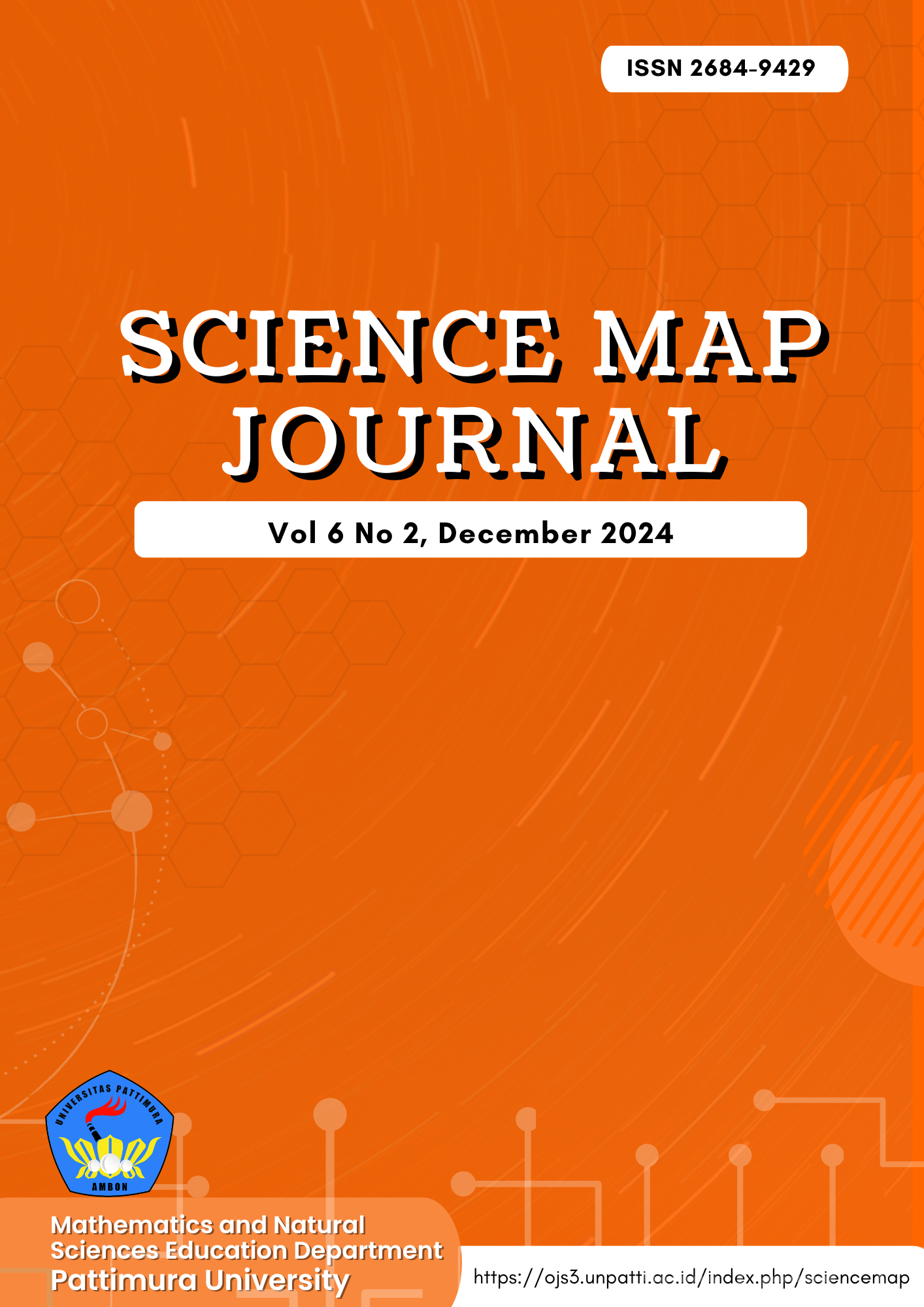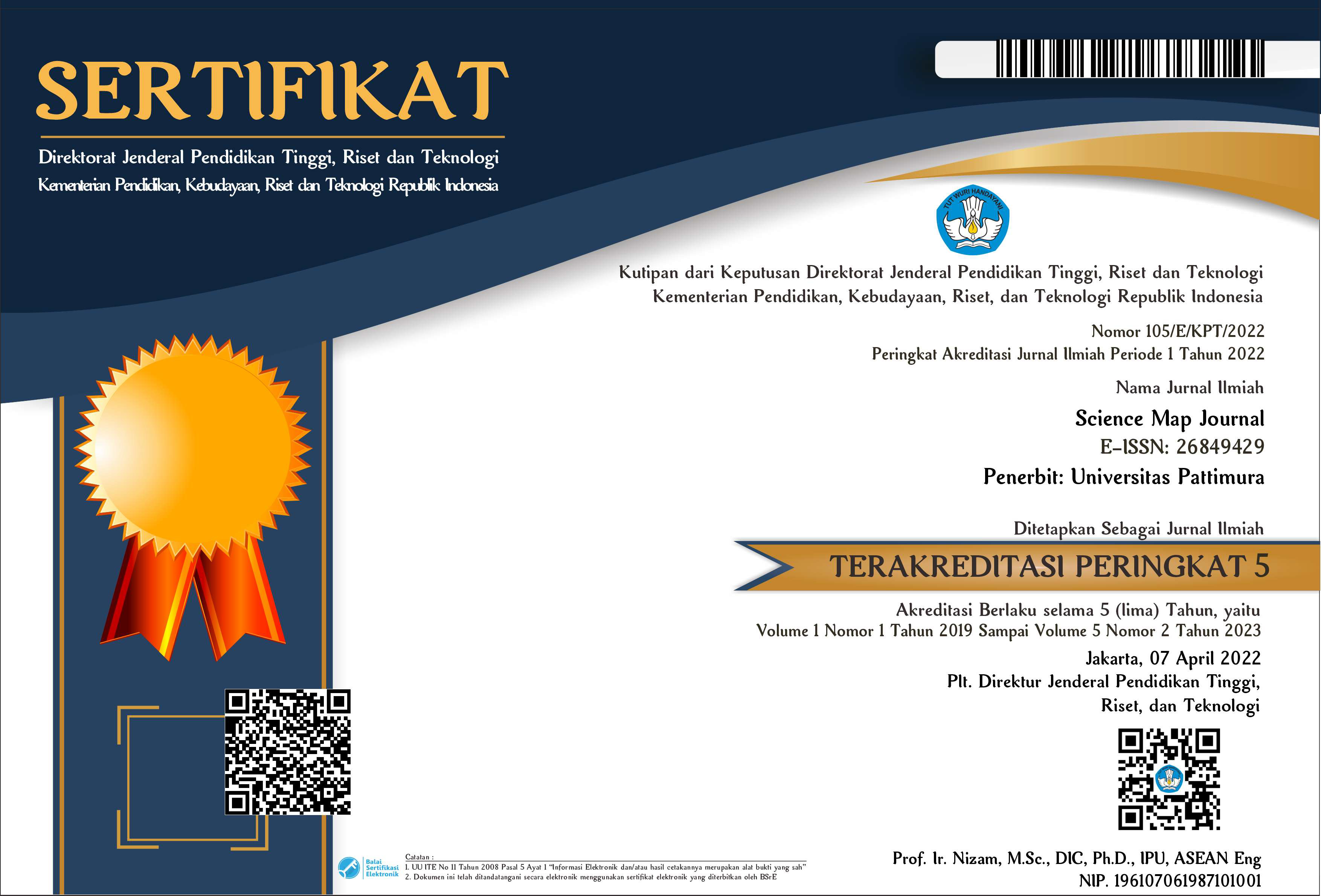SPATIAL TEMPORAL VARIATION OF LAND SURFACE TEMPERATURE IN AMBON CITY CENTER AREA
Abstract
Land use change from vegetation to built-up land in Ambon City Center affects the increase of land surface temperature and creates the urban heat island phenomenon, which has the potential to affect local and global climate. The method used in this research is the analysis of Landsat 8 satellite images through Google Earth Engine (GEE), which enables efficient and accurate data processing. The analysis shows that the highest surface temperature in the region increases from 27.35°C in 2015 to 29.30°C in 2025, while the lowest temperature also increases. These findings confirm the need for attention to sustainable spatial management strategies to reduce the negative impacts of urbanization, maintain environmental quality, and improve the quality of life of people in Ambon City
Downloads
References
Araújo de Oliveira, V. M. (2022). Urban Morphology. Springer International Publishing. https://doi.org/10.1007/978-3-030-92454-6
Arévalo, P., Bullock, E. L., Woodcock, C. E., & Olofsson, P. (2020). A Suite of Tools for Continuous Land Change Monitoring in Google Earth Engine. Frontiers in Climate, 2. https://doi.org/10.3389/fclim.2020.576740
BPS. (2024). Kota Ambon Dalam Angka 2024 (BPS Kota Ambon (ed.)). BPS Kota Ambon. https://ambonkota.bps.go.id/publication/2022/02/25/d4a1a955435993babeaa1777/kota-ambon-dalam-angka-2022.html
Diksha, Kumari, M., & Kumari, R. (2023). Spatiotemporal Characterization of Land Surface Temperature in Relation Landuse/Cover: A Spatial Autocorrelation Approach. Journal of Landscape Ecology. https://doi.org/10.2478/jlecol-2023-0001
Ermida, S. L., Soares, P., Mantas, V., Göttsche, F.-M., & Trigo, I. F. (2020). Google Earth Engine Open-Source Code for Land Surface Temperature Estimation from the Landsat Series. Remote Sensing, 12(9), 1471. https://doi.org/10.3390/rs12091471
Gorelick, N., Hancher, M., Dixon, M., Ilyushchenko, S., Thau, D., & Moore, R. (2017). Google Earth Engine: Planetary-scale geospatial analysis for everyone. Remote Sensing of Environment, 202, 18–27. https://doi.org/10.1016/j.rse.2017.06.031
Han, S., & Sun, B. (2019). Impact of Population Density on PM2.5 Concentrations: A Case Study in Shanghai, China. Sustainability, 11(7), 1968. https://doi.org/10.3390/su11071968
Hegazy, I. R., & Kaloop, M. R. (2015). Monitoring urban growth and land use change detection with GIS and remote sensing techniques in Daqahlia governorate Egypt. International Journal of Sustainable Built Environment, 4(1), 117–124. https://doi.org/10.1016/j.ijsbe.2015.02.005
Hu, Y., Tang, R., Jiang, X., Li, Z.-L., Jiang, Y., Liu, M., Gao, C., & Zhou, X. (2023). A physical method for downscaling land surface temperatures using surface energy balance theory. Remote Sensing of Environment, 286, 113421. https://doi.org/10.1016/j.rse.2022.113421
Kafy, A.- Al, Rahman, M. S., Faisal, A.-A.-, Hasan, M. M., & Islam, M. (2020). Modelling future land use land cover changes and their impacts on land surface temperatures in Rajshahi, Bangladesh. Remote Sensing Applications: Society and Environment, 18, 100314. https://doi.org/10.1016/j.rsase.2020.100314
Latue, Philia, C., Manakane, S. E., & Rakuasa, H. (2023). Analisis Perkembangan Kepadatan Permukiman di Kota Ambon Tahun 2013 dan 2023 Menggunakan Metode Kernel Density. Blend Sains Jurnal Teknik, 2(1), 26–34. https://doi.org/10.56211/blendsains.v2i1.272
Li, T., Cao, J., Xu, M., Wu, Q., & Yao, L. (2020). The influence of urban spatial pattern on land surface temperature for different functional zones. Landscape and Ecological Engineering, 16(3), 249–262. https://doi.org/10.1007/s11355-020-00417-8
Mansourmoghaddam, M., Rousta, I., Zamani, M., & Olafsson, H. (2023). Investigating and predicting Land Surface Temperature (LST) based on remotely sensed data during 1987–2030 (A case study of Reykjavik city, Iceland). Urban Ecosystems, 26(2), 337–359. https://doi.org/10.1007/s11252-023-01337-9
Maulana, J., & Bioresita, F. (2023). Monitoring of Land Surface Temperature in Surabaya, Indonesia from 2013-2021 Using Landsat-8 Imagery and Google Earth Engine. IOP Conference Series: Earth and Environmental Science, 1127(1), 012027. https://doi.org/10.1088/1755-1315/1127/1/012027
Moazzam, M. F. U., Doh, Y. H., & Lee, B. G. (2022). Impact of urbanization on land surface temperature and surface urban heat Island using optical remote sensing data: A case study of Jeju Island, Republic of Korea. Building and Environment, 222, 109368. https://doi.org/10.1016/j.buildenv.2022.109368
Mughal, M. O., Li, X.-X., & Norford, L. K. (2020). Urban heat island mitigation in Singapore: Evaluation using WRF/multilayer urban canopy model and local climate zones. Urban Climate, 34, 100714. https://doi.org/10.1016/j.uclim.2020.100714
Mutanga, O., & Kumar, L. (2019). Google Earth Engine Applications. Remote Sensing, 11(5), 591. https://doi.org/10.3390/rs11050591
Namkhan, M., Sukumal, N., & Savini, T. (2022). Impact of climate change on Southeast Asian natural habitats, with focus on protected areas. Global Ecology and Conservation, 39, e02293. https://doi.org/10.1016/j.gecco.2022.e02293
Onisimo Muntaga, L. K. (2019). Google Earth Engine Applications. Remotesensing, 11–14. https://doi.org/10.3390/rs11050591
Philia Christi Latue, H. R. (2023). Analisis Perubahan Suhu Permukaan Daratan di Kecamatan Ternate Tengah Menggunakan Google Earth Engine Berbasis Cloud Computing. E- JOINT ( Electronica and Electrical Journal of Innovation Technology), 4(1), 16–20. https://doi.org/https://doi.org/10.35970/e-joint.v4i1.1901
Rakuasa, H., & Latue, P. C. (2023). Monitoring Urban Sprawl in Ambon City Using Google Earth Engine: Memantau Urban Sprawl di Kota Ambon Menggunakan Mesin Google Earth. MULTIPLE: Journal of Global and Multidisciplinary, 1(2), 88–100.
Rakuasa, H., Huy-Hoang, D., Nasution, R. A. R., Turi, F., & Hidayatullah, M. (2024). Analysis of Land Surface Temperature Changes in Sorong City, Indonesia Using Landsat 8 Satellite Image Data Based on Cloud Computing. Journal of International Multidisciplinary Research, 2(7), 246–252. https://doi.org/https://doi.org/10.62504/jimr784
Rakuasa, H., Latue, P. C., & Pakniany, Y. (2024). Climate Change and its Impact on Asian Forest Landscapes: A Critical Review. Journal of Selvicoltura Asean, 1(1), 23–32.
Rakuasa, H. (2022). ANALISIS SPASIAL TEMPORAL SUHU PERMUKAAN DARATAN/ LAND SURFACE TEMPERATURE (LST) KOTA AMBON BERBASIS CLOUD COMPUTING: GOOGLE EARTH ENGINE. Jurnal Ilmiah Informatika Komputer, 27(3), 194–205. https://doi.org/10.35760/ik.2022.v27i3.7101
Rakuasa, H., & Budnikov, V. V. (2024). Assessing Settlement Suitability Using Road Network Analysis for Sustainable Urban Planning in Ambon City, Indonesia. Applied Engineering, Innovation, and Technology, 1(2), 68–74. https://doi.org/10.62777/aeit.v1i2.39
Rakuasa, H., Sihasale, D. A., Somae, G., & Latue, P. C. (2023). Prediction of Land Cover Model for Central Ambon City in 2041 Using the Cellular Automata Markov Chains Method. Jurnal Geosains Dan Remote Sensing, 4(1), 1–10. https://doi.org/10.23960/jgrs.2023.v4i1.85
Salakory, M., Rakuasa, H. (2022). Modeling of Cellular Automata Markov Chain for predicting the carrying capacity of Ambon City. Jurnal Pengelolaan Sumberdaya Alam Dan Lingkungan (JPSL), 12(2), 372–387. https://doi.org/https://doi.org/10.29244/jpsl.12.2.372-387
Sianturi, R. S., Perdana, A. P., & Ramdani, F. (2024). Monitoring Land Surface Temperature Trends in Indonesia. IOP Conference Series: Earth and Environmental Science, 1353(1), 012036. https://doi.org/10.1088/1755-1315/1353/1/012036
Tahooni, A., Kakroodi, A. A., & Kiavarz, M. (2023). Monitoring of land surface albedo and its impact on land surface temperature (LST) using time series of remote sensing data. Ecological Informatics, 75, 102118. https://doi.org/10.1016/j.ecoinf.2023.102118
Van Maarseveen, M., Martinez, J., & Flacke, J. (2019). (2018). GIS in sustainable urban planning and management: a global perspective. Taylor & Francis.
Copyright (c) 2025 Heinrich Rakuasa, Viktor Vladimirov Budnikov, Ahmat Rifai, Philia Christi Latue

This work is licensed under a Creative Commons Attribution 4.0 International License.




.png)


